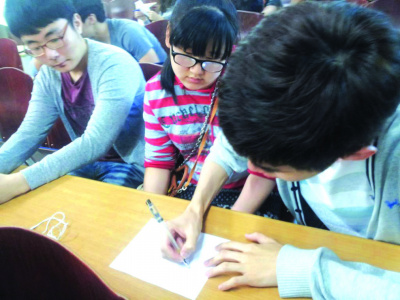
Founded by a group of Catholic volunteers in 1987, Chamuri serves as an educational outreach for students of the Seoul National School for the Blind (SNSB). It developed as a college student-based volunteering group a year after its foundation.
Unfortunately, the majority of institutes for blind students focus on practical skills such as massage therapy or acupuncture to aid their employment. Due to these circumstances, blind students who have the desire to engage in advanced education can grow distant from their real dream.
Meanwhile, Chamuri’s goal is to support blind students enter target universities and receive advanced education in college. Chamuri enhances their rights for learning and further contributes to a brighter future.
The classes of Chamuri are different from other ordinary education outreach in that they adhere to one-on-one tutoring. A university student is paired up with a blind student through the SNSB and visits the school to teach. The lesson takes place twice a week for one to two hours, and the goal of each class varies from studying for better school grades to preparing for the national college entrance exam, according to the student’s grade.
“We stick to one-on-one classes because we want to pay as close attention to our students as possible,” said Noh Pu-reum (History Education, 4), the leader of Chamuri. “The one-on-one tutoring system raises a sense of responsibility for the tutors, not just the quality of education students receive.”
Required to participate in teaching for at least four semesters, the tutors of Chamuri take their work seriously and receive feedback from the students through surveys, enabling them to enhance the quality of education they provide. They also hold meetings to exchange opinions about the classes and receive tips on teaching methods from the senior members of Chamuri.
Furthermore, Chamuri arranges group discussions to better understand the visually impaired and plans field trips for the students. As for the end of this year, Chamuri will invite Lee Chang-hun, the first blind anchor in Korea Broadcasting System, to have a talk concert about disabilities. Field trips include college tours, picnics and visiting tourist attractions, aiming to teach more than what is written in books. Although the field trips require extensive planning and preparations, they present opportunities for the tutors and students to bond outside the classroom and understand each other better.
“During a field trip to a museum, I was touched when my history student shared some of her thoughts with me,” Noh said. “I believe the comfortable atmosphere of the trip allowed her to open up to me although she had always been rather introverted and blunt during class.”
Chamuri tutors say that while teaching and participating in the activities, they themselves are provided with something special to learn as well.
“Chamuri made me think about disabilities from various perspectives and realize that the only difference between us and the students is difference in viewpoint,” Noh said. “I learned that difference is not wrong, but simply depends on how one accepts it, instead of merely understanding it.”
Chamuri welcomes anyone with passion to join them in teaching blind students. Those interested must attend the orientation at the beginning of the semester and fill out an application form given at the orientation or contact one of the members of Chamuri.
“Through Chamuri I realized that words like ‘disabled’ and ‘non-disabled’ create discriminatory perspectives that distance us from the blind,” Noh said. “I now realize that they are not different from us at all.”
Lee Ha-kyung
voteforkate@ewhain.net

